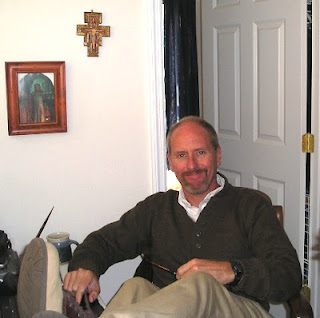cried out in a loud voice and said,
"Most blessed are you among women,
and blessed is the fruit of your womb..."
Fr. Paul Murray, O.P.
When Mary was greeted in this way by her elderly cousin Elizabeth, she at once sang her Magnificat. That great song of joy and self-knowledge in God."My soul glorifies the Lord, my spirit rejoices in the Lord God, my Saviour!"Mary was not able to respond in this way when she was greeted by the angel Gabriel. No- what in the end occasioned her joy were words spoken to her by Elizabeth, her elderly relative, very simple and very humble words of delighted recognition."Blessed are you among women, and blessed is the fruit of your womb!"
There is here, if I am not mistaken, an important but unexpected lesson. Sometimes we might be inclined to think that, without the confirmation of some interior vision or some deep experience in prayer, we cannot hope to know the joy of God's love for us.
But Mary's experience at the Visitation reminds us that such a deep and joyful realization can be the result of a simple good deed or act of generosity done to someone in need. Again and again, to our astonishment, we discover that it is in the poor, in those who need our help, that the Lord is waiting to fill us with the knowledge, the joyful knowledge that we are loved. And this knowledge is knowledge that heals.If we, who know ourselves to be wounded in some way, make an effort to help others who are suffering, if we "share our bread with the hungry"and try to"shelter the homeless poor" or make a visit to someone in need like Mary, then according to the prophet Isaiah, not only will we experience enlightenment of some kind, but"our wound will quickly be healed over"(Is 58:6-8). And why? Because in those who are most in need of help we will meet Christ: "Whatever you do to one of these, the least of my brothers/sisters, you do to me." - The Magnificat



